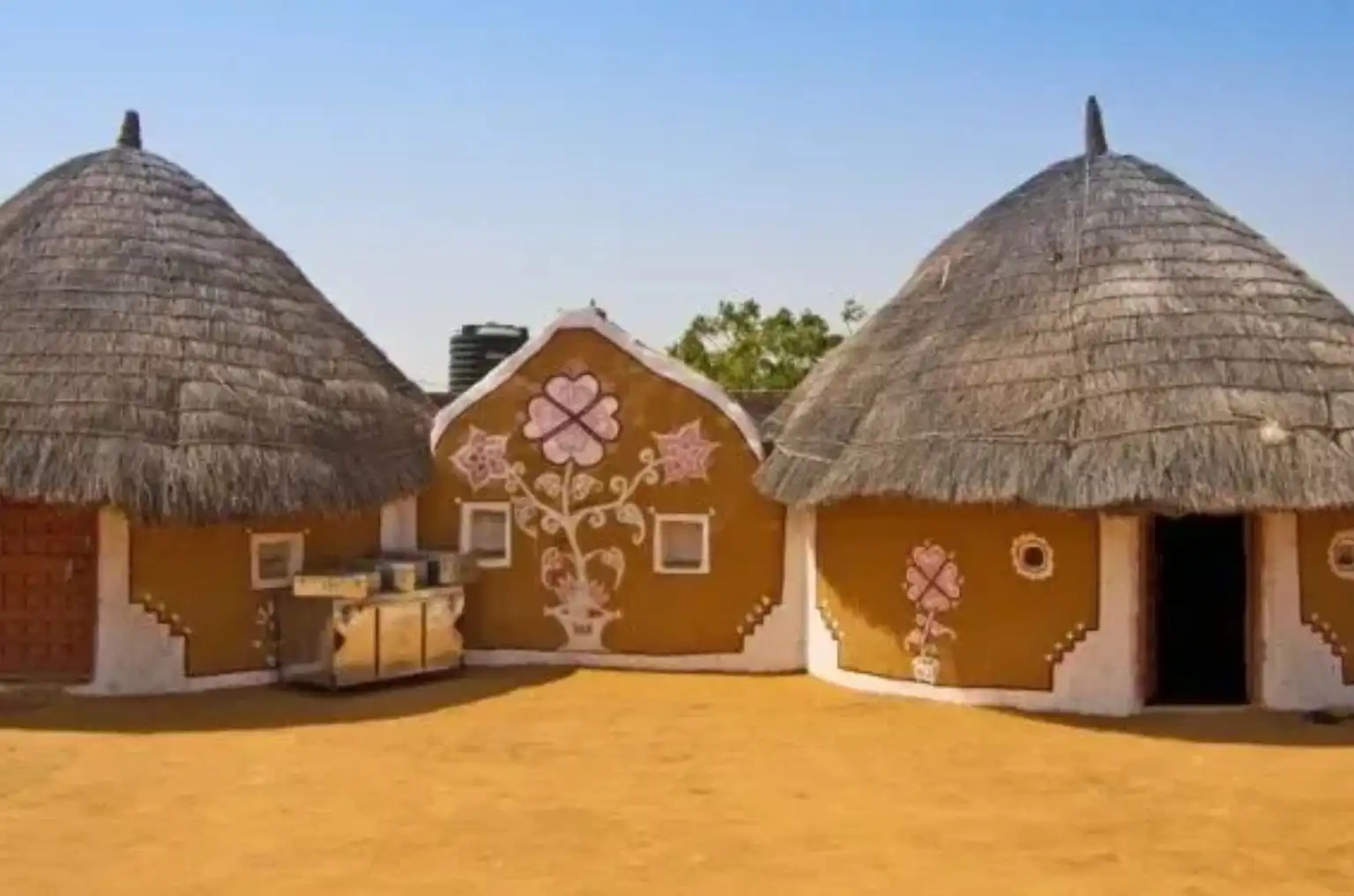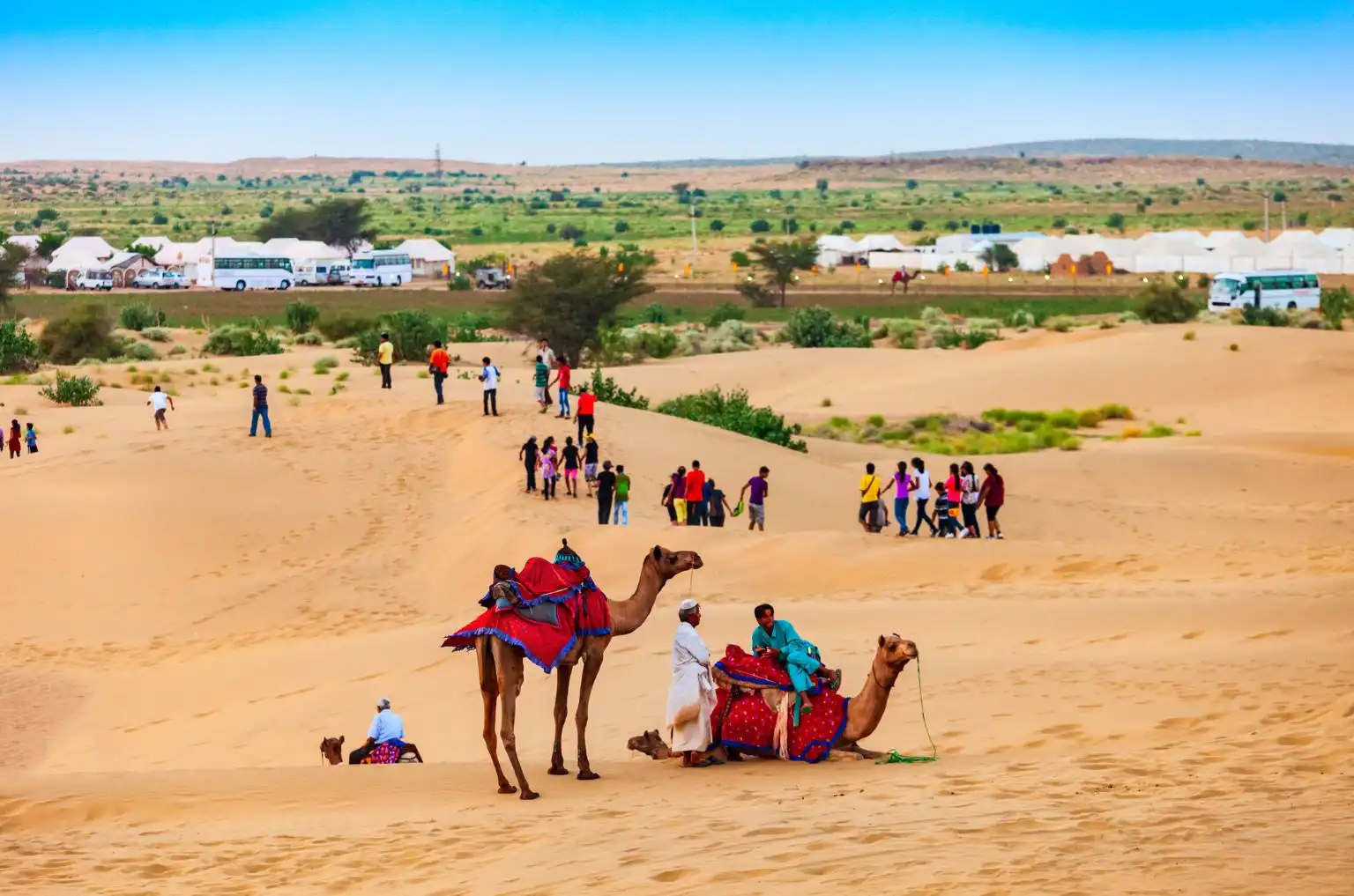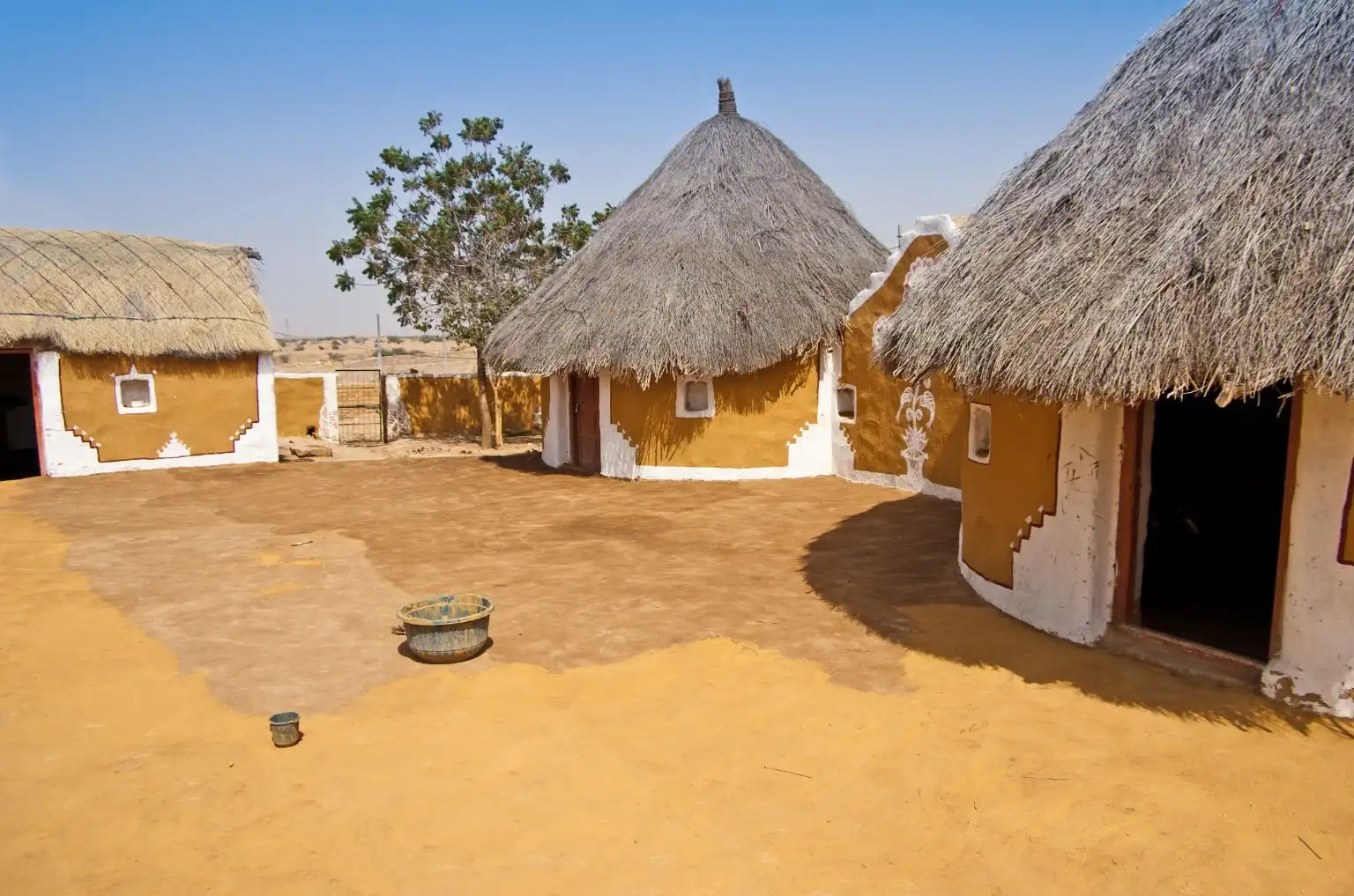
Bishnoi Safari: Where Conservation Meets Culture
In India, wildlife tourism usually promises excitement—growling tigers, thick jungles, and picture-rich opportunities. However, hiding in the outskirts of Jodhpur, Rajasthan, is a paradigm of hidden responsibility in the context of travelling. The Bishnoi Village Safari Tour is not just a wildlife sightseeing tour but a trip into a wild world where conservation is culture and compassion is the law. This is not merely a trip through a village; it is a trip in time, morals, and even the spirit of ethical travelling.
The desert here declares its tales in devotion and harmony—of people who have been protecting trees as kin and of antelopes as brothers. Not the roar of engines breaks the silence of the dunes, but the rhythmic chants of villagers who are still guided by the ecological principles of the 15th century. All the scenes, all the dialogs, and all the joint dinners read like a book in the unwritten Indian history of environmental harmony. The Bishnoi lifestyle does not simply exist within nature; it praises it. And that is what makes this safari the best of all in the country, a living lesson on what is meant by sustainability.
A Journey Into The Bishnoi Heartland

The history of the Bishnoi people starts in 1485 with the founding of a faith by Guru Jambheshwar, which was based on 29 principles. These are radical commandments centuries ahead of modern environmental ethics. Protecting trees, not killing animals, preserving water, and peacefully coexisting with animals of all living shapes were some of the lessons taught to the Bishnois. The Bishnois turned environmental consciousness into a religion at a time when few people were ever thinking of climate matters.
The Khejarli Massacre: A Legacy of Sacrifice
The best-known of their sacrifices was the Khejarli Massacre of the 18th century, when more than 360 Bishnoi men and women sacrificed their lives to protect the trees by not allowing them to be cut down. It was not symbolic activism; it was belief in action. The same moral power pervades all the villagers nowadays and gives rise to a style of life in which all living organisms belong to some divine harmony.
You are getting into this legacy when you visit the Bishnoi Village Safari. There is meaning in every tree, animal, and pond. It is not just wildlife that you are watching, but a kind of ancient philosophy that still exists because of everyday living conservation.
Wildlife Encounters With Compassion

The unique feature of this safari is its tone. Most wildlife excursions are spectacles: drama, hunting, or the big cat hunt. Nevertheless, wildlife experiences in the Bishnoi land face the aspect of tranquility and respect.
Harmony Between People and Wildlife
The Blackbuck, with all its grace of spiraled horns, is roaming about; it is grazing free and apprehends its bonds with the villagers. Chinkaras and blue bulls are grazing in the arid scrubland. Peacocks sing on top of the rooftops, and the migratory birds sleep on serene lakes such as Guda Bishnoi Lake. Landscape is not a fenced-in park; it is an open ecosystem between people and wildlife.
The Spirit of True Conservation
You will find here a marvelous rapport with the animals that have faith in us. This can be done since Bishnois do not treat wildlife as a trophy or property but as a divine creature. This connection is explained by tour guides, who are usually residents of the Bishnoi. They also make travelers aware of not only the location of the animals but also their reason for being here, since benevolence rather than force reigns the land. This is pure conservation, as it is not a matter of law and patrol but rather a matter of community morals. It is, in a way, the most humane wildlife tourism that one can be subjected to.
Beyond The Wild: Immersing In The Soul Of Bishnoi Culture

The Bishnoi safari tour is all about humans, not the animals. In addition to the wildlife experiences, the traveler is invited to homesteads and hospitality at homes where hospitality is still done in the desert. You can observe potters molding clay into pots, or weavers weaving colored dhurries, or women preparing the traditional Rajasthan meals over open fires. All the actions are still real and not fake before the cameras.
Sustainable Living and Traditional Practices
Even the architecture is about sustainability—mud houses that are cool when it is hot in the desert, and construction made out of the local materials that do not stand out from the natural environment. Tourists tend to accompany families to drink chai tea, hear folktales about the courage of their forefathers, or even witness rituals, which award the elements. Every minute you spend learning about how the Bishnoi has made environmentalism a way of life.
A Cultural Experience Like No Other
To most of the tourists, this cultural integration would be the most interesting part of the trip. It is a welcome change from the conventional safaris that do not view the local communities. The people on the Bishnoi territory are the custodians—and you are their visitor, who has come to see how human life may reconcile with nature rather than oppose it.
A Model Of Ethical Tourism
By considering an ethical wildlife tour as the kind that guarantees protection of animal welfare, preservation of local livelihood, and appreciation of the environment, the Bishnoi Safari Tour is the gold standard. It has successfully incorporated conservation, community, and culture in a model that not many destinations can emulate, despite their aspiration to do so.
Community-Based and Low-Impact Tourism
In this case, tourism is community-based. Local families serve as both guides and hosts, and also as artisans. This guarantees that the revenue made from the safari goes back to the village economy. There are no huge lodges or invasive development schemes like in the commercial wildlife resorts. The tours have very low infrastructure, and so the environment is not disturbed.
Education and Awareness for Visitors
Education is also important. Tourists do not observe; they learn. Each narration made by the guide upholds the Bishnoi philosophy of coexistence. Tourists not only take home photos but also have a better understanding of nature and the local heritage.
It is a combination of education, compassion, and low-impact adventure that makes it an excellent instance of sustainable tourism in India. It shows that travelling is not solely pleasurable but also morally upright, that it can give strength instead of taking away.
Why The Bishnoi Experience Feels More Real Than Typical Wildlife Tours

India presents the blazing scenes of wildlife experiences through the tiger reserves, elephant safari, and bird lakes. However, the Bishnoi experience is one of the few that combine culture and conservation in a perfect combination.
Comparing Bishnoi Safari With Other Indian Wildlife Experiences
Tiger safaris in areas such as Ranthambore or Bandhavgarh can be exciting to view, yet they are usually accompanied by difficulties of crowding, engine noises, and minimal participation of locals. Tourists can observe amazing animals, but still, this experience is not related to the life of the place.
The reserves in Southern India, like Periyar, have made good steps in terms of community-based tourism. Previous poachers are guides, and the eco-lodges are focused on low impact. These, however, are still controlled structures where wildlife lives isolated from human habitation.
Where Culture and Conservation Coexist
The Bishnoi Village Safari is different, as the whole environment is combined. The blackbuck forages along a field by a farmer; migratory birds mix with village herders in their ponds. Here, culture and conservation cannot be separated. Tourists are not entering a wildlife area; they are entering a biological ecosystem where humans and animals have been living together for centuries without fences.
For those who are interested in being authentic in their travels, rather than being lavish and kind-hearted rather than conquering, this safari is more fulfilling. It is not a race to cross off a list, but it is a rediscovery of the lost relationship of humans to nature.
The Role Of India Wonderland

India Wonderland, being a top-ranking touring firm in the responsible and experiential travel industry, has been critical in bringing global tourists into the Bishnoi animosity. We help the hi-tech generation to meet the age-old wisdom by encouraging the Bishnoi Village Safari Tour.
Empowering Local Communities
The company guarantees that tours are carried out in a friendly manner, which includes small groups and environmentally friendly modes of transport, and equitable deals with the Bishnoi community. Much of the funds are used to empower the local programs, enabling the families to continue with their customary livelihoods without losing their cultural backgrounds.
Creating Meaningful Experiences
Through the collaboration with professional tour operators, the authenticity has been maintained. Each of the itineraries will promote valuable encounters—guests will talk with local people, visit local craft workshops, and get to know the surrounding flora and fauna. This intelligent design is what turns an ordinary field trip and its impact into an educational trip.
India Wonderland is linked to such efforts, and with this kind of effort, it can be said that tourism, when done ethically, can not destroy but preserve. It shows that conservation travel can now become both profitable and meaningful, and this is all about finding a way to balance business interests and environmental and social well-being.
The Future Of Travel Lies In Ethics
The Bishnoi Village Safari can be considered the future model of the Indian sustainable tourist destination version, where the community is considered the core and the tourist is the disciple. However, it will be necessary to remain balanced in the frontier of vision and integrity as the world is given a growing interest.
Balancing Growth With Sustainability
The issue is that it is difficult to scale responsibly. The number of visitors should be limited to ensure that it does not destroy the delicate ecosystem as the number of visitors grows. The infrastructure should be kept minimal, and wildlife should be allowed to move freely and in their natural way.
Transparency and Technology in Future Tourism
It will also be important to be transparent. Travelers in the future will need to know what happens to their money—how much of it assists in conservation, and how much of it lifts the community. The Bishnoi model already has such intuitiveness, but to codify such transparency will make it stay ahead of the world standards.
Technology may help but not take over, such as drones in ecological management, software in education, and apps for responsible visitor management. Nevertheless, the human relationship should be in the middle. The hearts change not because of a screen but because of a face-to-face talk with one of the Bishnoi elders.
Setting the Global Standard for Responsible Travel
Last but not least, the bigger tourism sector should come to appreciate the importance of this model. Instead of copying its principles and making a shallow duplication of them, the destinations need to revitalize their principles: respect, restraint, and reciprocity. When these values are combined in the huge travelling environment of India, the country may emerge as a world leader in ethical tourism.
Why Bishnoi Village Safari Still Leads The Way

The Bishnoi Safari Tour fulfills all the requirements when you consider what makes traveling really meaningful, like authenticity, compassion, education, and sustainability. It is neither a selective exhibition nor the continuing narrative of being together. It proposes that a visitor should not eat of an experience but engage in it softly, deferentially, with open eyes.
There are not many wildlife tours in India that give such moral clarity as this one. This safari helps us realize that nature can be explored the most, sometimes not when we are deep into the jungle, but in a simple village where people have been preserving life most of the time without attention.
A Journey Of The Heart
Therefore, can the Bishnoi Village Safari be deemed as the most ethical wildlife tour in India? For travelers who consider empathy an important factor, rather than excitement and prestige, the answer is yes.
It is an uncommon form of conservation travel in which you not only observe the wild, but you also become a member of a living ecology that has mastered harmonious coexistence between man and nature. It also views that being ethical in traveling does not mean avoiding pleasure but seeking pleasure in being responsible.
With companies like India Wonderland continuing to promote and protect this experience, the Bishnoi Village Safari Tour is poised to remain not only a highlight of Rajasthan but also a guiding light for sustainable tourism in India. It is the soul of ethical traveling—as such, quiet, enduring, and profoundly inspiring.




